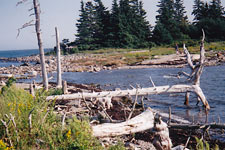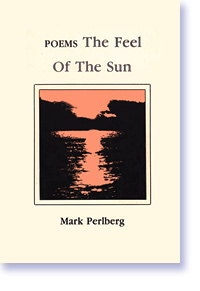
 |
 |
 |
 |
 |
 |
 |
 |


The Burning Field
The Feel of the Sun
The Impossible Toystore
Waiting for the Alchemist
Theater of Memory
The Burning Field
William Morrow, 1960
Mark Perlberg’s first book, The Burning Field, explores themes of childhood—his own and those of his daughters—art, the natural world, and history. There are several poems that deal with the loss of his father at age five. The book ends in a title sequence of seven poems that recall with equal doses of humor and love his boyhood summers on Peaks Island, Maine. The last poem in the sequence follows the poet’s return to the abandoned baseball field he came to as a boy to watch the island team play ball with men from other islands along Casco Bay:
Our team wore every kind of uniform, it seemed,
For those Sunday games, each man a living advertisement
With a label stitched across his back.
The shortstop played for the island and for Jones’ Market.
The catcher pumped gas at Forest City Landing.
Chicago poet Ralph Mills wrote in a review of The Burning Field:
“In poem after poem, Perlberg’s love, imagination, strength and subtly profound responsiveness to others and to the shapes and colors of the world fashion a celebration of existence. It is a celebration which never fails to acknowledge pain, tragedy, death and transitoriness, but in the end accepts them as part of the unfathomable, inescapable character of reality. ‘I have fought long to understand my life,’ he writes, and the creation of these poems, so deftly blended of intuition, craftsmanship and remarkable sensitivity, is a triumphant result of that struggle.”
Used copies of The Burning Field are available from Amazon.

The Feel of the Sun
Swallow Press/Ohio University Press, 1981
Fellow poet Bill Ott writes of Perlberg’s second book, The Feel of the Sun:
“Perhaps because of his keen awareness of life’s impermanence, Perlberg writes of the pleasures of the senses with a special sensitivity. Seeing things clearly (before they perish), he seems to say, is the solace of being human. Examples of Perlberg’s clarity of vision abound. In one poem he notes ‘how the trout hang in pools like dark flags’; in another, he imagines sunset as a time ‘when light lies down in the weeds/And the sky takes on color like a bruise.’
In his response to the natural world one recognizes an affinity with, as he writes in a poem, his 'friends the Chinese poets.' Often that affinity is expressed in poems of only a few lines, as in 'Summer Storm In Wisconsin.'"
Thunder woke us early
In the cabin under the trees.
It was dawn, gray and watery—
Then the light grew green as under sea—
More lightning, sudden rain,
Then the fume of cedar on the breeze.
Perlberg’s love of the Chinese poets was a life-long preoccupation. The Feel Of The Sun includes a group of poems by the Chinese poets Tu Fu, Wang Wei, and Li Ch’ing Chao. Perlberg translated them in collaboration with a scholar of classical Chinese. The New York Times Book Review placed his version of a poem by Tu Fu on its front page when reviewing Sunflower Splendor, the anthology that includes Perlberg’s translations.
Used copies of The Feel of the Sun are available from Amazon.

The Impossible Toystore
Louisiana State University Press, 2000
Louisiana State University Press brought out Mark’s third book, The Impossible Toystore, and remained his publisher for the two books that followed.
The book opens with themes from his family history, including, once more, his father’s early death and his conflicted relation with his mother. His stepfather plays a role, as does his overeducated, hapless Swedish grandfather. The central poem in the book is “Nightsweat,” a poem about the poet’s heart surgery and the nightsweat that visits him afterward “in the violent dark.” There are also love poems and a further return to his childhood years. The book closes with another of his compressed, short poems:
Spaces
Leave a space for the unexpected.
The red sun put out by fog at noon.The tree backlit on our walk that night—
a vast face on the fog’s scrim.The adagio of Mahler’s Fifth on the radio
when we came in, played not like a dirge
but a song.
The poet Lisel Mueller wrote about this book: “The Impossible Toystore is the best collection of poems I have read in a long time. One reason it is so satisfying is that it is so rich. It does what is rare in our time. It manages to be deeply personal and yet to embrace the larger world with insight, passion and curiosity.”
The Impossible Toystore can be purchased through your local independent bookstore or directly from the publisher, Louisiana State University Press.

Waiting for the Alchemist
Louisiana State University Press, 2008
In Mark Perlberg’s fourth book of poems, the artist seems to be almost an accidental instrument of the poem, “who just happens to lend the poem his voice. He accomplishes this in part by his sensitive touch with rhyme and assonance.”
Maine poet and President of The Island Institute Philip Conkling refers to his “sharp and pungent island references.… I especially appreciated Perlberg’s insight about an ancient islander in ‘The Old Man in the Green House,’ still holed up in a house that’s falling apart while his neighbors are trying to get him to move into elder housing. Nothing doing. He won’t hear of it,” Conkling observes.
But most islanders will push just so far.
Then they wonder who is helping whom.
In his review of Alchemist, the poet James Reiss discusses the longest poem in the book, “Song of the Platelets.” Perlberg wrote the poem during his final bout with leukemia, writing and revising it as he traveled back and forth from home to hospital. He said he enjoyed working in his hospital room: “It’s peaceful here and the view is beautiful. It’s almost like working in my study at home.”
Reiss comments: “Perlberg steadfastly refuses to rage against the dying of the light. Instead, ‘Song’ dramatizes conversations Perlberg has, principally with an African-American nurse, Benina, and with an unnamed volunteer, a retired rabbi who has come to comfort him at the hospital. [As Benina draws his blood] she says, ‘ “Now come platelets—be nice / We need to get this young man / outta this place for New Years. / Talk to your platelets / Mr. Mark. Talk to them!” / I’m with you, Benina. / I’m with you. / I do talk to my platelets.’
“Later when the rabbi advises Perlberg about ‘Hashem, / God the Merciful,’ the poet grouses, ‘I hate to say this to you, Rabbi … / Even the sublime 23rd is a cop-out, a pipedream. / I ask myself, do I want it read at my funeral? / It’s poetry, not promise.’
“[Near the end of the poem] Mr. Mark throws us a tidbit of déjà vu. … [I]nsomniac and alone in the wee hours, all at once he remembers:Suddenly a long ago attic in the big brick house
my father built above the river and died in soon after.
Somehow, the house is ours again. I am ten.
I open an attic door and walk out under the eaves.
They are there: trunks, dismantled beds, pictures
turned to the wall, toys, games, my lead soldiers.
No one is home. A night of wild wind, violent rain.
“We’ll be able to read [Perlberg’s best poems] years from now, and I predict that their dirt-simple plain style will weather well,” Reiss concludes. He then quotes a short poem in its entirety, pointing out that Perlberg mines the “monosyllables” of his “plain style” to give the reader a “unique haiku-like nugget of imagery and insight.”
More
I pin a yellow cottonwood leaf
on my brown cork board
and that’s the fall.I keep a chunk of an old oak lobster pot
with rusty nail holes
and that’s the sea.I have it from a cardinal, the Roman kind,
diminishment, too,
is a form of growth.
Waiting for the Alchemist can be purchased through your local independent bookstore or directly from the publisher, Louisiana State University Press.
Theater of Memory
New and Selected Poems of Mark Perlberg
Perlberg's final volume includes selections from each of his earlier books as well as a group of previously unpublished poems written just prior to his death. A group of the final poems appeared in the spring 2012 issue of Prairie Schooner.
Life | Writing | Books | Theater of Memory | Poetry Center | Teaching | Contact | Home

